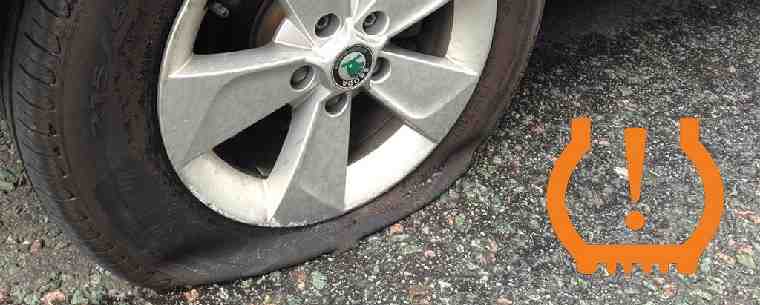MOT Woes For Drivers With Faulty TPMS - New MOT Criteria
Kwik Fit | Friday 8th January 2021 11:05am

TPMS, otherwise known as a Tyre Pressure Monitoring System, is undoubtedly one of the biggest innovations in tyre safety in recent years. The technology itself has actually been around for several decades now with the Porsche 959 being the first passenger car to adopt TPMS in 1986. It’s only in the last few years that car manufacturers have included TPMS features in a growing number of car models and, since 2014, all new cars manufactured in Europe are fitted with TPMS as standard.
However, TPMS sensors have also caused drivers a major headache, particularly when the time comes for their annual MOT check.
TPMS checks were added to the MOT test checklist in January 2015 and it can now be an instant MOT fail if the TPMS dashboard light stays on to indicate a fault or problem with the TPMS valves. Many motorists don’t realise this, which has led to thousands of new MOT failures that could have been easily avoided.
The tyre safety charity, TyreSafe, estimate that as many as 20,000 MOT tests have been failed so far due to a faulty TPMS warning light being displayed on the dashboard. The charity is holding drivers accountable for failing to carry out regular, simple checks to ensure their tyres are roadworthy and their TPMS is fully functioning.
What is TPMS?
Tyre Pressure Monitoring Systems feature a special tyre pressure sensor in each tyre valve that is linked to the vehicle’s on-board computer. The sensors constantly monitor for pressure irregularities in the tyres and, if a loss of pressure is detected, the driver is alerted via a dashboard warning light so that appropriate action can be taken.
Your tyre pressure only needs to drop by around 6 PSI below the recommended tyre pressure for the light to illuminate. It is believed that TPMS has helped to save many lives and avoid countless traffic accidents by alerting drivers to tyre problems when they need it most – while out on the road travelling at speed.
Common TPMS Problems
One of the most common TPMS sensor issues is battery failure. Each TPMS sensor is fitted with an internal battery which is designed to last 100,000 miles. The more miles you travel, the faster the battery will deplete – but a sensor battery should last 5 to 7 years. In most sensor variants, the battery is sealed into the sensor casing and cannot be replaced, so a replacement sensor should be fitted.
Another problem is that while the sensor itself is seated safely inside the tyre, the valve stem is a bit of a weak link. The stem protrudes from the tyre and rim, so is open to the elements and has to deal with everything the road can throw at it. Salt used to grit roads is particularly damaging and the metal sensor stems can become corroded over time – eventually becoming brittle. If the valve stem is damaged, the whole sensor will need to be replaced.
TPMS sensors should last for many years, but benefit from regular servicing to ensure they continue to work correctly and prevent an avoidable MOT fail. At Kwik Fit, we believe in preventative maintenance. Your TPMS sensors should be serviced every time the tyre bead is broken.
If you have questions about your vehicle’s TPMS or you require a new TPMS sensor, pop into your local Kwik Fit centre and we’ll be happy to help. Our technicians are fully trained to service your TPMS and we provide a cost-effective sensor replacement for the fraction of the price of a dealership replacement.
Any facts, figures and prices shown in our blog articles are correct at time of publication.
Featured Articles
Is it Illegal to Drive With One Headlight?
Saturday 19th July 2025
Wondering if it’s illegal to drive with one headlight? Learn about the safety risks and penalties of illegal blown bulbs and why you should fix them promptly.
Air Con in EVs & Hybrids: Experts Answer Your Questions
Monday 30th June 2025
Does air con drain EV batteries? Can you use the air con while charging an electric car? Find out the answers to these questions & more from Kwik Fit’s experts.
Why Is Your Car Making a Noise? Fixes & Tips
Friday 13th June 2025
When your car starts making unexpected noises, it can certainly be quite disconcerting; it may be nothing to worry about, but here’s what you need to know.









